BLACKSTAR Id 260 Tvp User Manual
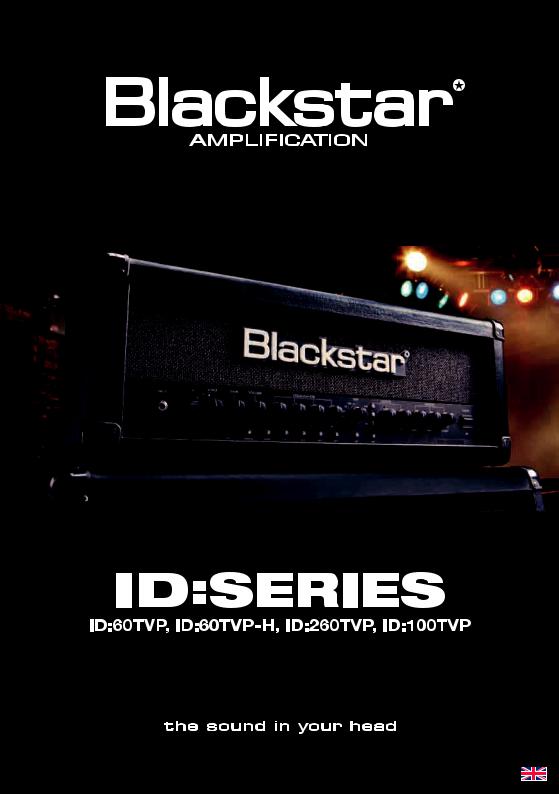
Owner’s Manual
Designed and Engineered by Blackstar Amplification UK
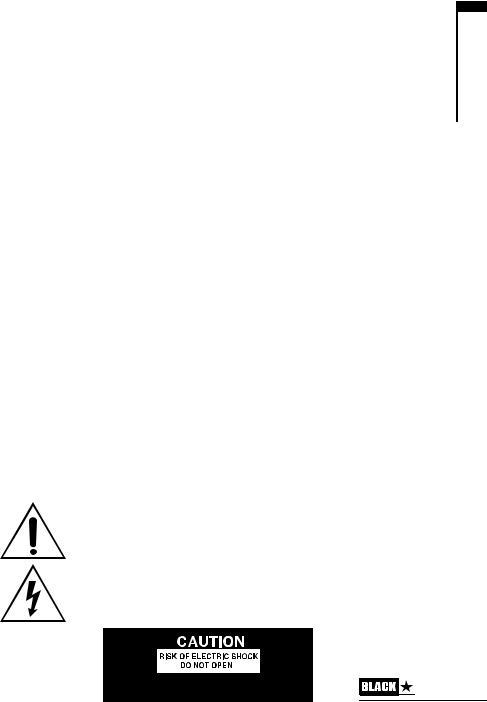
IMPORTANT SAFETY INSTRUCTIONS
1.Read these instructions.
2.Keep these instructions.
3.Heed all warnings.
4.Follow all instructions.
5.Do not use this apparatus near water.
6.Clean only with dry cloth.
7.Do not block any ventilation openings.
8.Install in accordance with the manufacturer’s instructions.
9.Do not install near any heat sources such as radiators, heat registers, stoves, or other apparatus (including amplifiers) that produce heat.
10.Do not defeat the safety purpose of the polarized or grounding-type plug. A polarized plug has two blades with one wider than the other. A grounding type plug has two blades and a third grounding prong. The wide blade or the third prong are provided for your safety. If the provided plug does not fit into your outlet, consult an electrician for replacement of the obsolete outlet.
11.Protect the power cord from being walked on or pinched particularly at plugs, convenience receptacles, and the point where they exit from the apparatus.
12.Only use attachments/accessories specified by the manufacturer.
13.Unplug this apparatus during lightning storms or when unused for long periods of time.
14.Refer all servicing to qualified service personnel. Servicing is required when the apparatus has been damaged in any way, such as power-supply cord or plug is damaged, liquid has been spilled or objects have fallen into the apparatus, the apparatus has been exposed to rain or moisture, does not operate normally, or has been dropped.
“TO COMPLETELY DISCONNECT THIS APPARATUS FROM THE AC MAINS, DISCONNECT THE POWER SUPPLY CORD PLUG FROM THE AC RECEPTACLE”.
“WARNING: TO REDUCE THE RISK OF FIRE OR ELECTRIC SHOCK, DO NOT EXPOSE THIS APPARATUS TO RAIN OR MOISTURE AND OBJECTS FILLED WITH LIQUIDS, SUCH AS VASES, SHOULD NOT BE PLACED ON THIS APPARATUS”.
This symbol is intended to alert the user to the presence of important operation and maintenance (servicing) instructions in the literature accompanying the appliance.
This symbol is intended to alert the user to the presence of uninsulated “dangerous voltage” within the product’s enclosure that may be of sufficient magnitude to constitute a risk of electric shock to persons.
Canada / USA
3
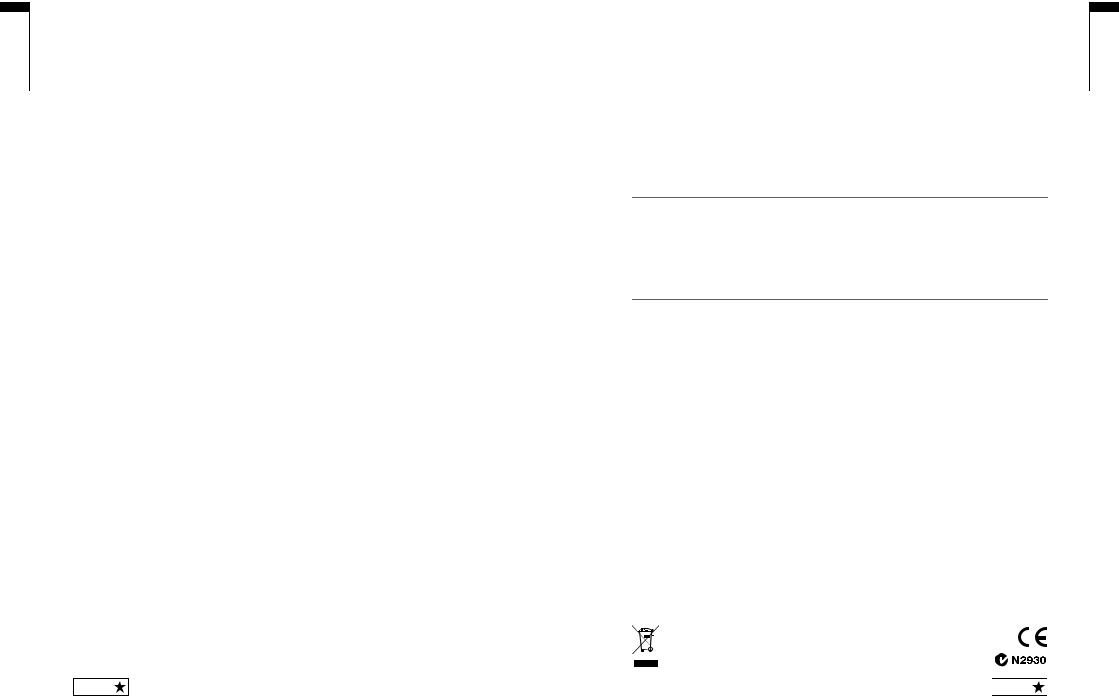
English
Warning!
Important safety information!
READ THE FOLLOWING INFORMATION CAREFULLY. SAVE ALL INSTRUCTIONS FOR FUTURE REFERENCE!
Follow all warnings and instructions marked on the product!
Danger! High internal operating voltages.
Do not open the equipment case. There are no user serviceable parts in this equipment. Refer all servicing to qualified service personnel.
Clean only with a dry cloth.
Condensation can form on the inside of an amplifier if it is moved from a cold environment to a warmer location. Before switching the unit on, it is recommended that the unit be allowed to reach room temperature.
Unauthorised modification of this equipment is expressly forbidden by Blackstar Amplification Ltd.
Never push objects of any kind into ventilation slots on the equipment casing.
Do not expose this apparatus to rain, liquids or moisture of any type.
Do not place this product on an unstable trolley, stand or table. The product may fall, causing serious damage to the product or to persons!
Do not cover or block ventilation slots or openings. This unit must only be used in a well ventilated area and never switched on when it is within a poorly ventilated space, such as a bookcase.
This product should not be placed near a source of heat such as a stove, radiator, or another heat producing amplifier.
Use only the supplied power cord which is compatible with the mains voltage supply in your area.
Power supply cords should always be handled carefully and should be replaced if damaged in any way.
Never break off the earth (ground) pin on the power supply cord.
The power supply cord should be unplugged when the unit is to be unused for long periods of time.
An apparatus with Class I construction should be connected to a mains socket outlet with a protective earthing connection.
The mains plug of the power supply cord should remain readily accessible.
Before the unit is switched on, the loudspeaker should be connected as described in the handbook using the lead recommended by the manufacturer.
Always replace damaged fuses with the correct rating and type.
Never disconnect the protective mains earth connection.
High loudspeaker levels can cause permanent hearing damage. You should therefore avoid the direct vicinity of loudspeakers operating at high levels. Wear hearing protection if continuously exposed to high levels.
If the product does not operate normally when the operating instructions are followed, then refer the product to a qualified service engineer.
The U.S. Government's Occupational Safety and Health Administration (OSHA) has specified the following permissible noise level exposures:
Duration Per Day In Hours |
Sound Level dBA, Slow Response |
8 |
90 |
6 |
92 |
4 |
95 |
3 |
97 |
2 |
100 |
1½ |
102 |
1 |
105 |
½ |
110 |
¼ or less |
115 |
According to OSHA, any exposure in excess of the above permissible limits could result in some hearing loss.
Ear plug protectors in the ear canals or over the ears must be worn when operating this amplification system in order to prevent a permanent hearing loss if exposure is in excess of the limits as set forth above. To ensure against potentially dangerous exposure to high sound pressure levels, it is recommended that all persons exposed to equipment capable of producing high sound pressure levels such as this amplification system be protected by hearing protectors while this unit is in operation.
All electrical and electronic products should be disposed of separately from the municipal waste stream via designated collection facilities appointed by the government or the local authorities.
English
4 |
|
|
|
|
5 |
|
|
|
|
|
|
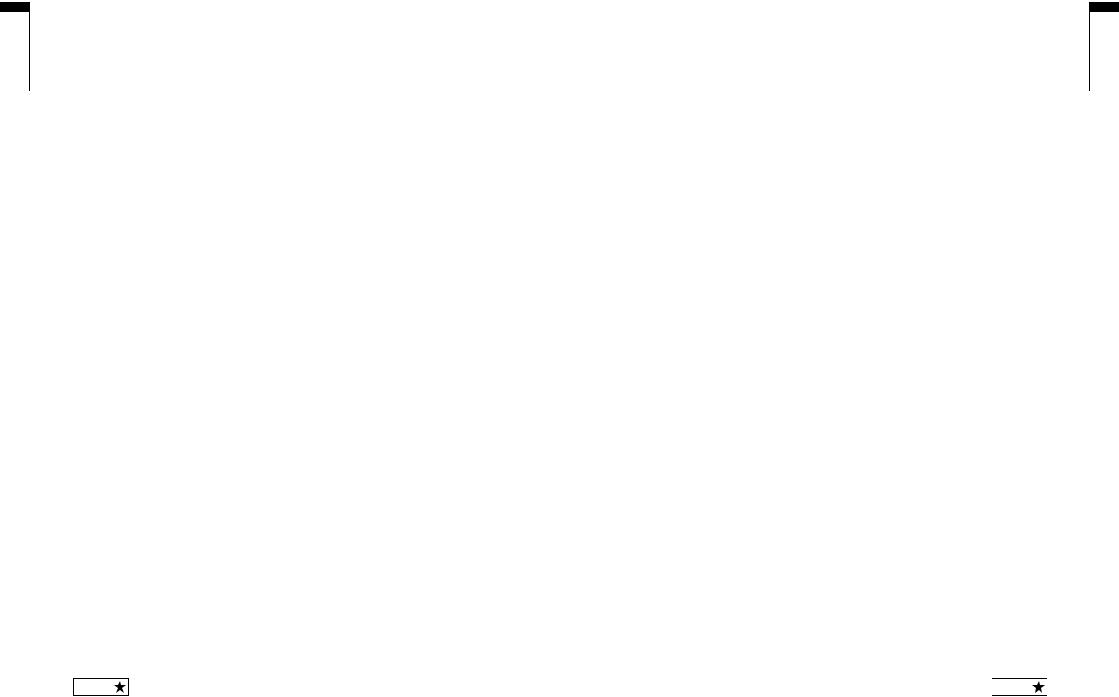
English
Introduction
Thank you for purchasing this Blackstar ID:Series amplifier. Like all our products, this amp is the result of countless hours of painstaking Research and Development by our world-class design team. Based in Northampton (UK), the Blackstar team are all experienced musicians themselves and the sole aim of the development process is to provide guitarists with products which are the ultimate tools for self-expression.
All Blackstar products are subjected to extensive laboratory and road testing to ensure that they are truly uncompromising in terms of reliability, quality and above all TONE.
The ID:Series represents a truly ground-breaking achievement, combining unique innovations, an intuitive, traditional control set and the versatility of programmability.
Please read through this handbook carefully to ensure you get the maximum benefit from your new Blackstar product.
If you like what you hear and want to find out more about the Blackstar range of products please visit our website at www.blackstaramps.com.
Thanks!
The Blackstar Team
Features
In the five years since its launch, Blackstar has led the way in the innovation of guitar amplification. The ID:Series represents the culmination of more than seven years’ technical research and development. These amps have an intuitive control set like a traditional amp, but have the versatility of programmability. The unique controls allow you, the guitarist, to custom design your own sound, store it and then have the confidence that the amp will perform in a live environment.
Blackstar’s patent-applied-for True Valve Power offers six distinctly different power valve responses – EL84, 6V6, EL34, KT66, 6L6, KT88. When engaged it delivers the response, dynamics, sag and break up characteristics of a valve amp and uniquely delivers the same acoustic power output as an equivalent valve power amp. This means these amps deliver live without compromise – True Valve Power means LOUD as valveTM.
The Voice control has six different settings – Clean Warm, Clean Bright, Crunch, Super Crunch, OD 1, OD 2. When used together with Blackstar’s patented ISF control you can get the exact tone you’re thinking of.
The effects section delivers studio quality modulation, delay and reverb effects simultaneously that you can store with your sound.
Deep editing and storing of patches is simple using the Blackstar Insider software.
Patches can be shared, uploaded and downloaded via the online community. The
USB connector also allows you to record from your amp directly to your computer.
An emulated output, MP3/line input and MIDI footswitching complete the package.
By using the unique Voice control, the patented ISF and patent-applied-for True Valve Power, ID amplifiers allow unparalleled flexibility and ease of use, enabling you to, in effect, design the sound in your head and deliver it live as LOUD as valveTM. Individuality is power!
English
6 |
|
|
|
|
7 |
|
|
|
|
|
|
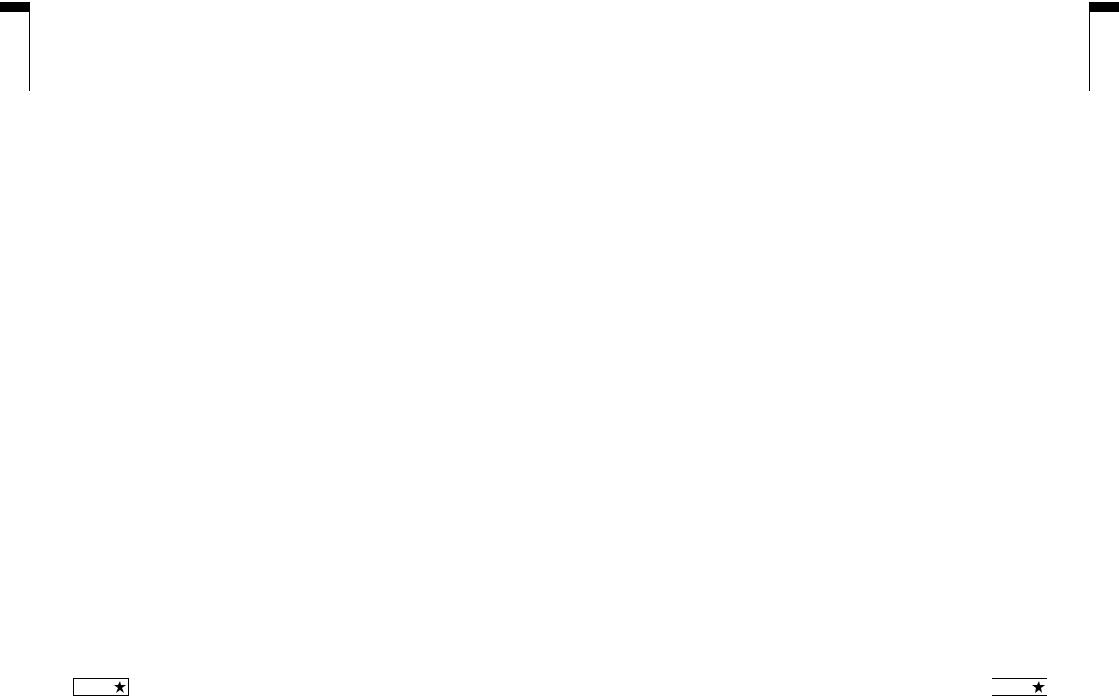
English
Demo Mode
When the amplifier is first switched on after purchase, or after a factory reset, it will be in ‘Demo Mode’. The sound you hear will reflect the physical position of the front panel knobs as it will be in Manual Mode. All effects, plus TVP will be turned off.
All amplifier patch locations will contain Blackstar factory defaults. Patches can be created and stored in Demo Mode but the original factory default patches and settings will be restored each time the amplifier is turned off and turned on again.
To exit Demo Mode, hold down the Manual button (22) while switching the amplifier on. The Bank LED (23) will change from red, to orange, to green and then turn off to indicate that Demo Mode has been deactivated. If the Manual button is released before the Bank LED has cycled through all colours and switched off, then the operation is cancelled and the amplifier will remain in Demo Mode.
Blackstar’s Insider software can also be used to exit Demo Mode. From within the program, right click on the Demo Mode label and select ‘Disable’.
Factory Reset
The default factory patches and settings can be restored to your amplifier at any time. Simply hold down the MOD, DLY and REV buttons simultaneously, whilst switching on the amplifier. The bank LED will illuminate, and change from green, to orange, to red, to indicate that a factory reset is imminent. This process will take a total of two seconds. If any of the MOD, DLY and REV buttons are released before the bank LED has cycled through all colours and switched off, then the operation is cancelled and the amplifier will remain unaffected.
Once this is complete the amplifier will be in Demo Mode again.
IMPORTANT NOTE: This process will overwrite any user content.
English
8 |
|
|
|
|
9 |
|
|
|
|
|
|

English
Front Panel
1. Input
Plug your guitar in here. Always use a good quality screened guitar lead.
2. Voice
The Voice control changes the preamp voicing, ranging from ultra clean to extremely overdriven.
Clean Warm – Very clean, dynamic
Clean Bright – ‘Boutique’, will break up when pushed hard
Crunch – Classic medium gain overdrive
Super Crunch – More gain and punch than Crunch
OD 1 – Hot-rodded Master Volume overdrive with medium power amp damping
OD 2 – Mid boosted hot-rod overdrive
This setting is saved when you store a patch.
3. Gain
The Gain control adjusts the amount of overdrive or distortion. Low settings, counter clockwise, will deliver a clean sound on the edge of break-up. As the Gain control is turned clockwise the sound will become more overdriven, moving through beautiful crunch tones until, at its maximum position, a full distorted tone is achieved. This setting is saved when you store a patch.
4. Volume
This controls the preamp volume. Turning it clockwise increases the volume. High levels of volume will introduce the effect of valve power amp distortion and compression, depending on the TVP (9) setting you have selected. This setting is saved when you store a patch.
5. Bass
The bass control adjusts the amount of low-end frequencies in your tone. This amp has an advanced tone shaping circuit which allows the tone to be tight and cutting
(counter clockwise) to warm and thumping (clockwise). This setting is saved when you store a patch.
6. Middle
The middle control adjusts the amount of middle frequencies in your tone. The middle frequencies are particularly important in setting the amount of ‘body’ your tone has. With the middle control set to its minimum position (fully counter clockwise) the sound will be aggressive and scooped, a tone ideal for aggressive rhythm playing. As the middle control is increased (clockwise) the amount of ‘body’ is increased, which is more suitable for sustained lead guitar tones. This setting is saved when you store a patch.
7. Treble
The treble control allows exact adjustment of the treble frequencies within the sound.
At low settings (counter clockwise) the sound will be warm and dark in character.
As the treble control is increased (clockwise) the sound will become brighter. At the maximum settings the sound will be aggressive and cutting. This setting is saved when you store a patch.
8. ISF |
|
|
|
|
|
|
|
The patented ISF control works in conjunction with |
|
|
|
the Bass, Middle and Treble controls. It allows you |
|
|
|
to choose the exact tonal signature you prefer. Fully USA |
|
|
UK |
counter clockwise has a more American characteristic |
|
|
|
with a tight bottom-end and more aggressive middle, |
|
|
|
and fully clockwise has a British characteristic which is |
|
|
|
more ‘woody’ and less aggressive. |
|
|
|
Unlike conventional ‘contour’ controls and parametric equalisation systems, the
Bass, Middle and Treble controls remain interactive with each other just like in a traditional guitar amplifier tone stack. This leads to a very familiar, musical response. This setting is saved when you store a patch.
9. TVP (True Valve Power) Selector
Blackstar’s patent-applied-for True Valve Power offers six distinctly different power valve responses – EL84, 6V6, EL34, KT66, 6L6 and KT88. When engaged it delivers the response, dynamics, sag and break-up characteristics of a valve amp and uniquely delivers the same acoustic power output as an equivalent valve power amp. This means that these amps deliver live without compromise – True Valve Power means LOUD as ValveTM.
TVP changes the characteristics of the sound from compressed and spongy to dynamic and tight.
EL84 |
Bell-like full bodied Class A with lots of compression |
6V6 |
Crisp Class A with high compression and tight mids |
EL34 |
Classic British Class A/B crunch with full bodied soft break-up |
KT66 |
Rich and warm vintage British hot biased Class A/B |
6L6 |
Tight dynamic Class A/B with extended high and lows |
KT88 |
Tight, bold and dynamic Class A/B with strong low end |
As you move from EL84 to KT88 the amount of compression and overdrive available from each valve response is reduced. Additionally, when either of the two clean voices is selected the output compression and overdrive are affected by the gain control.
This setting is saved when you store a patch.
10. TVP (True Valve Power) Switch
Pressing this switch turns TVP on and off. The internal button LED will light to show TVP is on. When the LED is off, TVP is not active and the TVP Selector will be deactivated. This setting is saved in a patch.
NOTE: With TVP off the power amplifier has a linear response and you will not be able to achieve the valve-like sag, compression and power that TVP delivers.
English
10 |
|
|
|
11 |
|
|
|
|
|
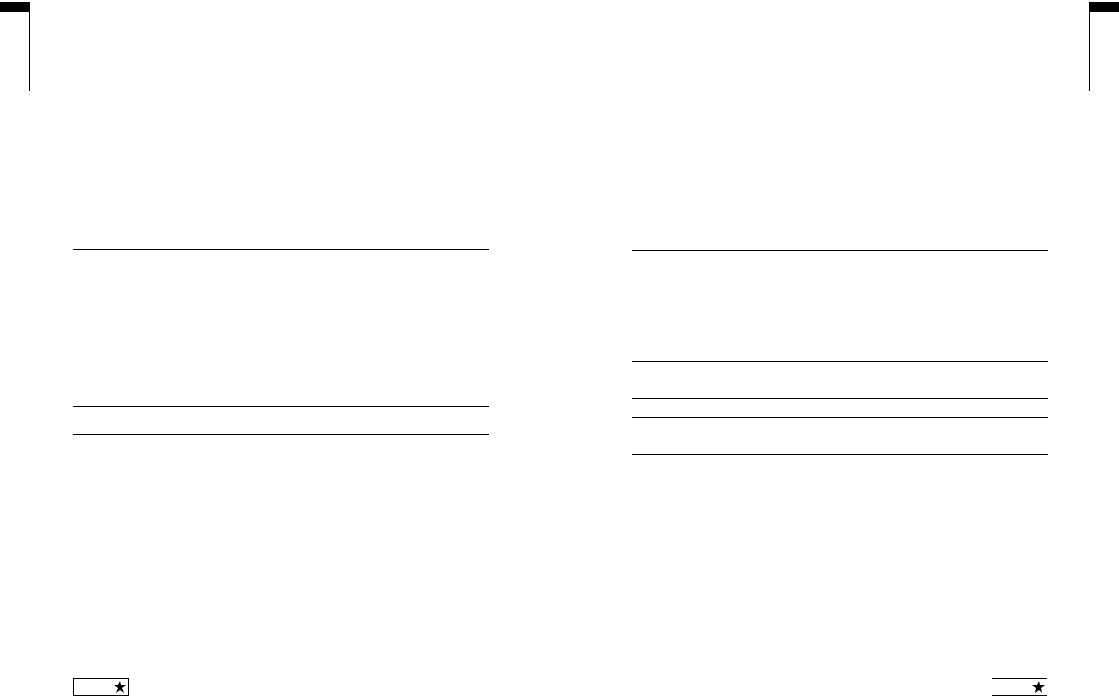
English
Effects
Up to three studio quality effects can be switched on at any time.
11. MOD (Modulation)
Press this switch to turn the modulation effect on, off, or focus the effect for editing. This setting is saved when you store a patch.
12. DLY (Delay)
Press this switch to turn the delay effect on, off, or focus the effect for editing. This setting is saved when you store a patch.
13. REV (Reverb)
Press this switch to turn the reverb effect on, off, or focus the effect for editing. This setting is saved when you store a patch.
With all three of the effect switches the LED will show what state it is in:
LED |
Effect State |
Description |
LED not on |
Effect off |
Effect not active |
LED red |
Effect on but not ‘focused’ for editing |
Effect is active, but not affected by the front |
|
|
panel effect controls |
LED green |
Effect on and ‘focused’ for editing |
Effect active and affected by the front panel |
|
|
effect controls |
Repeatedly pressing each effect switch on the front panel has the following effect:
Effect off |
Turns the effect on and ‘focuses’ the effect. Any previously focused effect |
|
reverts to an ‘on’ state |
Effect on but not ‘focused’ |
Focuses the effect. Any previously focused effect reverts to an ‘on’ state |
Effect on and ‘focused’ |
Turns the effect off. If any other effect(s) are on, the previously ‘focused’ |
|
effect resumes being ‘focused’ |
NOTE: Only one effect may be ‘focused’ at any time
14. Effect Type
This changes the effect type and edits a parameter of the currently ‘focused’ effect
(modulation, delay, or reverb).
Each segment represents a different effect (four for each type of effect). An LED shows which effect type is currently active. The distance travelled through the ‘segment’ modifies an effect parameter. The Effects Table below shows the modifiable parameters:
This setting is saved when you store a patch.
15. Effect Level
This modifies an effect parameter. For modulation and delay effects, turning the Level control while holding down the Tap button (16) modifies the rate/time of the effect.
The Effects Table below shows the modifiable parameters:
This setting is saved when you store a patch.
16. Tap
The Tap button is used to set the rate/time of the current ‘focused’ effect. The time between each press of the tap button defines the rate set.
Once set, the Tap LED will flash in time with the set rate of the currently ‘focused’ effect.
The Effects Table below shows the modifiable parameters:
Effects Table
Effect |
Segment Parameter |
Level Parameter |
Tap Parameter |
MODULATION |
|
|
|
Phaser |
Mix |
Depth |
Speed |
Flanger |
Feedback |
Depth |
Speed |
Chorus |
Mix |
Depth |
Speed |
Tremolo |
Frequency modulation depth |
Amplitude modulation depth |
Speed |
DELAY |
|
|
|
Linear |
Feedback |
Delay level |
Time |
Analogue |
Feedback |
Delay level |
Time |
Tape |
Feedback |
Delay level |
Time |
Multi |
Feedback |
Delay level |
Time |
REVERB |
|
|
|
Room |
Size |
Reverb level |
- |
Hall |
Size |
Reverb level |
- |
Spring |
Size |
Reverb level |
- |
Plate |
Size |
Reverb level |
- |
This setting is saved when you store a patch.
Master
17. Resonance
The Resonance control sets the overall bass response. At lower settings the cleans will be tight and funky and overdrives will be focused in their bass response. At increased settings the clean sounds will be become full and warm, whilst the crunch and overdrive tones will be more bass heavy and resonant.
This is a global setting and not saved when storing a patch.
English
12 |
|
|
|
|
13 |
|
|
|
|
|
|
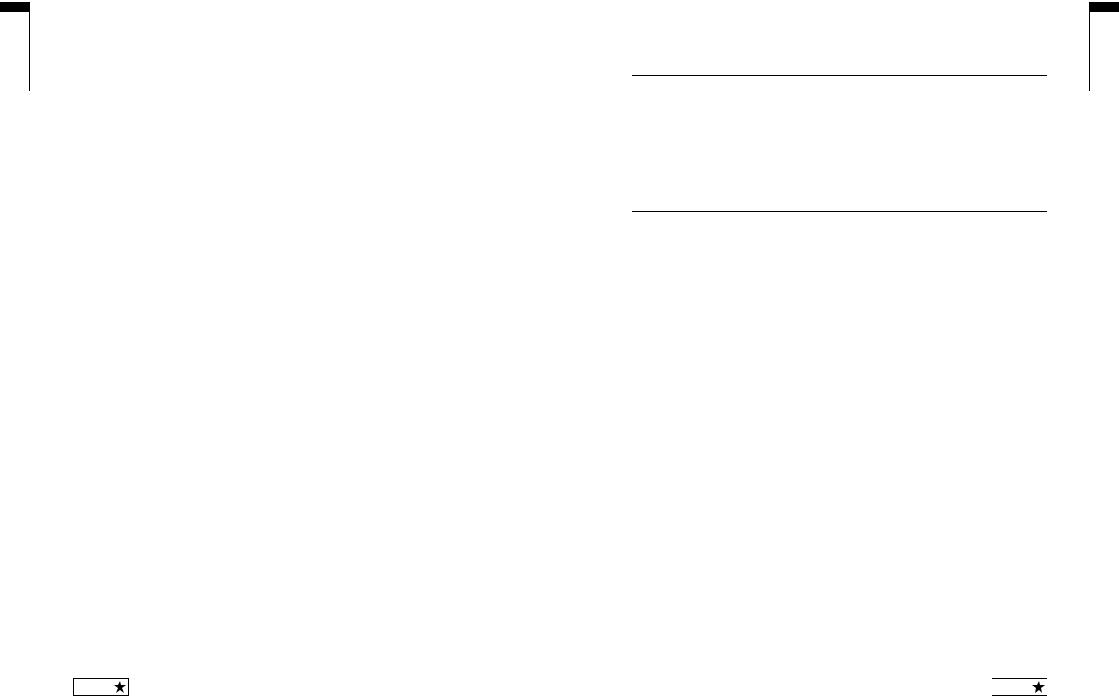
English
18. Presence
The Presence control sets the overall treble response. Percussive high-end can be accentuated on clean sounds and the amount of aggressive treble controlled with crunch and overdrive settings.
This is a global setting and not saved when storing a patch.
19. Master Volume
This controls the overall volume of your amplifier. Turning it clockwise increases the volume. This is a global setting and not saved when storing a patch.
If the master volume is at zero this allows for silent recording via the emulated output or USB. The emulated level is controlled via the preamp volume.
20. Power Switch
This switch is used to turn the amplifier on and off.
NOTE: when in Demo Mode powering the amplifier off and then on restores the factory default settings. When not in Demo Mode, the amplifier will retain its state when powered back up.
21. USB
Plug a USB cable in here to connect the amplifier to a Windows PC or Mac. Blackstar’s Insider software can be downloaded from our website and offers a host of features.
See the USB Audio section on page 20 for more information.
NOTE: The amplifier will appear on a personal computer as an audio capture device within recording software.
22. Manual
Press this switch to toggle between Manual Mode and the current patch. When the amplifier is in Manual Mode, the sound will reflect the current physical position of the knobs. This is applicable to the Voice, Gain, Volume, Bass, Middle, Treble, ISF and TVP knobs. The TVP on/off state will be retained from the previously active patch. Any effects that are active when switching to Manual Mode will be turned off.
While in Manual Mode any of the controls can still be modified by an external source
(Blackstar Insider software, footswitch, MIDI controller), but this means that the sound will not represent the positions of the knobs on the front panel.
Tuner Mode
Holding the Manual button (22) for three seconds will engage the tuner. The Recall Indicator LED (28) will flash continuously to indicate the amplifier is in Tuner Mode. By default the amplifier ouput will be muted whilst in Tuner Mode.
The Manual, Bank and Channel LEDs will indicate the closest note to the note being played.
Bank LED |
String 1 and 6 (default E, low/high) |
CH1 LED |
String 2 |
CH2 LED |
String 3 |
CH3 LED |
String 4 |
CH4 LED |
String 5 |
The MOD, DLY and REV LEDs act as indicators to show how close the played note is to the tuned note.
MOD LED red |
Note is sharp (above pitch) |
DLY LED green |
Note is in tune |
REV LED red |
Note is flat (below pitch) |
All other LEDs on the front panel will be off in Tuner Mode.
Pressing any button will exit Tuner Mode.
23. Bank
Press the button to scroll through the first three banks of patches.
Bank 1 2
Bank 2 3
Bank 3 1
The green LED indicates you’re in Bank 1, the orange LED indicates you’re in Bank 2 and the red LED indicates you’re in Bank 3.
NOTE: The first three banks can be selected from the front panel. When you activate
Bank 4 and higher from an external controller (e.g. Blackstar Insider software, footcontroller), the Bank LED will not be lit but the channel LEDs will continue to show you the patch location.
For example:
Patch 11 – Bank LED red, Channel 3 LED lit.
Selecting Bank 15 from an external controller will switch you to patch 15 – Bank LED off, Channel 3 lit.
When the amplifier is in Manual Mode, the Bank LED will not be lit.
The channel will be remembered, therefore the corresponding patch within the current bank will be loaded when scrolling through the banks.
English
14 |
|
|
|
|
15 |
|
|
|
|
|
|

English
24 – 27. Channels 1-4
Channel 1 activates the first patch within the currently active bank. Channel 2 activates the second patch within the currently active bank. Channel 3 activates the third patch within the currently active bank. Channel 4 activates the fourth patch within the currently active bank.
28. Recall Indicator
The Recall Indicator shows if there is a mismatch between the current value of a parameter within the amplifier and the corresponding physical front panel control. E.g. when you change to a different patch the controls on the front panel may not always reflect the setting you are hearing.
To prevent unexpected level jumps in the control you are adjusting, the front panel knobs will have no effect on the sound until the knob reaches the current parameter value. Once reached, the Recall Indicator flashes twice and the knob ‘takes control’ of the value and can increase or decrease the value.
The recall indicator will flash twice each time the physical knob ‘passes through’ the value stored within the current patch so you can easily see the programmed value.
Recall is only active for Gain, Volume, Bass, Middle, Treble and ISF.
When the Tuner is active the Recall Indicator will flash continuously.
Programmability
Storing Patches
To store the current sound as a patch
1.Press and hold any of the four Channel buttons for one second. All four
Channel LEDs will begin to flash.
2.Press the Bank button to toggle through the three banks (green, orange, red) to choose the store location.
3.Press any of the four Channel buttons once to store the patch in the chosen location.
The LED corresponding to the chosen store location will illuminate and the new patch will be active.
Green bank = Patches 1-4 Orange bank = Patches 5-8 Red bank = Patches 9-12
The amplifier controls can be used to edit the patch at any stage of the store process.
Press the Manual button at any stage to cancel the store process and return the amplifier to the last state.
Storing a patch will overwrite any previous patch in that location.
Patches can also be stored via Blackstar’s Insider software or a connected Blackstar FS-10 footcontroller.
Recalling Patches
Press any Channel button to load that patch.
Pressing the Bank button will cycle through the three banks – green-orange-red.
The Channel will be preserved, therefore the corresponding patch within the current
Bank will be loaded when scrolling through the Banks.
Alternatively, patches can be recalled via Blackstar’s Insider software or any connected footswitch.
MIDI
ID:Series amplifiers are able to recall patches via MIDI Program Change messages and to dynamically modify amplifier values via MIDI Control Change messages.
To set-up MIDI control, simply connect your MIDI controller’s MIDI Out socket to the MIDI In socket on the rear of the amplifier.
From new, or after a Factory Reset, the amplifier is set to OMNI mode and responds to MIDI messages on all MIDI channels.
NOTE: You may wish to set the amplifier to respond to MIDI messages on just a single MIDI channel. This can be done using the Blackstar Insider software to specify which of the 16 MIDI channels to use, or to return the amplifier to OMNI mode.
Recalling Patches
To recall a patch, the MIDI controller should be set to transmit Program Change messages (this is usually the case for footcontrollers). Changing patches on the MIDI controller will activate the corresponding patch stored within the amplifier.
Modifying Patch Values
Many patch values (e.g. Gain, Volume, ISF – see MIDI Implementation Chart on page 102 ) can be adjusted via MIDI Control Change messages in real time. The
MIDI controller should be set to send the Control Change messages as defined in the MIDI Implementation Chart.
English
16 |
|
|
|
|
17 |
|
|
|
|
|
|
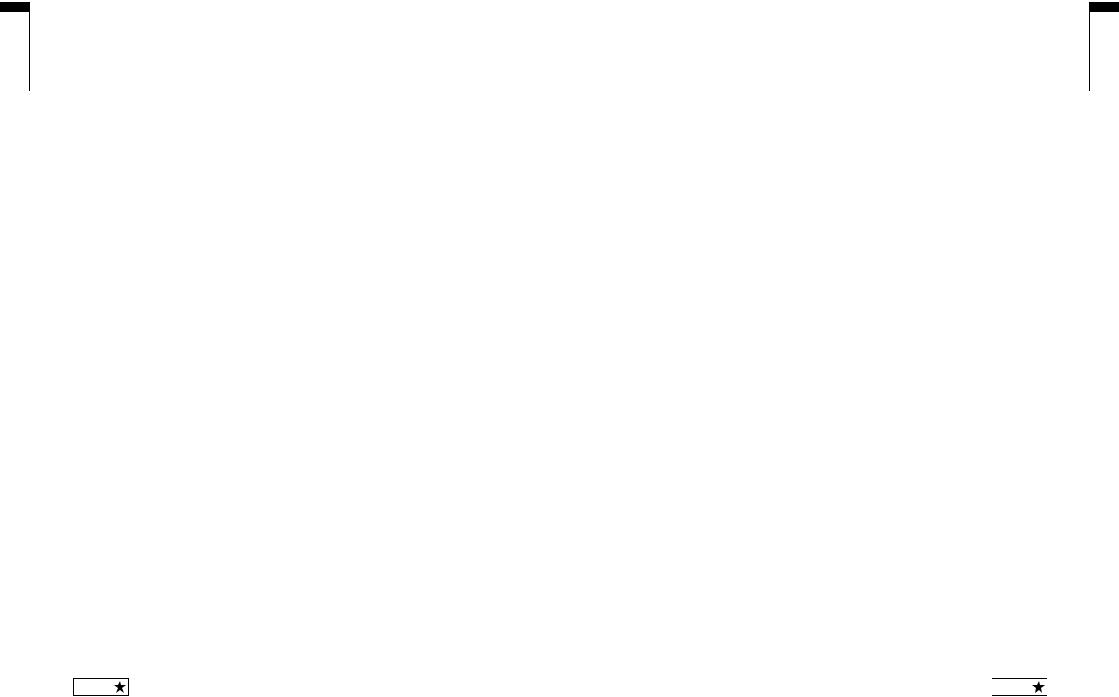
English
Rear Panel
1. Mains Input
The supplied detachable mains lead is connected here. The lead should only be connected to a power outlet that is compatible with the voltage, power and frequency requirements stated on the rear panel. If in doubt get advice from a qualified technician.
2. Speaker Outputs
ID:60TVP, ID:100TVP
There are two parallel speaker outputs for connecting external speaker cabinets. The minimum load is 4 Ohms.
WARNING: The combined impedance must never be less than 4 Ohms (e.g. 1 x 4
Ohm cabinet, or 2 x 8 Ohm cabinets). Failure to correctly match the impedance of the amplifier and speakers will damage the amplifier.
NOTE: 2 x ID:412 4 Ohm cabinets cannot be used together.
ID:260TVP
There are two speaker outputs (1x left channel, 1x right channel) for connecting the internal speakers or external speaker cabinets.
The internal speakers are directly plugged into these outputs and must be unplugged before external cabinets can be connected.
The minimum load is 4 Ohms.
WARNING: The impedance of each output must never be less than 4 Ohms. Failure to correctly match the impedance of the amplifier and speakers will damage the amplifier.
ID:60TVP
The speaker output is for connecting the internal speaker or external speaker cabinets.
The internal speaker is directly plugged into this output and must be unplugged before an external cabinet can be connected.
The minimum load is 4 Ohms.
WARNING: The impedance must never be less than 4 Ohms. Failure to correctly match the impedance of the amplifier and speakers will damage the amplifier.
3. MIDI In
If using MIDI is required, connect the MIDI device here. Refer to the MIDI section for more details. Always use a good quality MIDI lead.
4. Footswitch
Connect one of the following supported footswitches here.
1 button footswitch
Use any latching footswitch (e.g. a Blackstar FS-4) to switch between Channels 1 and 2 of the currently selected Bank.
Footswitch latched OFF (e.g. LED extinguished on the FS-4) activates Channel 1 Footswitch latched ON (e.g. LED illuminated on the FS-4) activates Channel 2
Blackstar FS-10 Footcontroller
This multi function footcontroller allows you to access all patches, toggle effects and program patches.
MIDI footcontrollers
Functionality will depend on your footcontroller.
5. MP3/Line In
Connect the output of your mp3 or CD player here. Adjust the player’s volume to match that of your guitar to enable you to play along.
NOTE: The connection is mono.
6. Emulated Output
This output emulates the tonal characteristics of a guitar speaker cabinet and provides a natural tone for connection to a recording device or mixing desk
To make full use of the stereo effects, use a stereo jack to two mono jacks splitter lead to feed two channels of the recording device or mixer. The output will also function into a mono guitar type lead. Always use a good quality screened lead.
Turning the Volume knob (4) will control the Emulated Output level. The Master Volume only affects any connected speaker(s)/cabinet(s).
NOTE: To ‘silently’ record, set the Master Volume to zero. You may also record from this output without a loudspeaker connected, but ensure that no loudspeaker leads are connected to any of the loudspeaker output jack sockets of the amplifier, as this will defeat the load protection circuit and will cause damage to the amplifier.
English
18 |
|
|
|
|
19 |
|
|
|
|
|
|
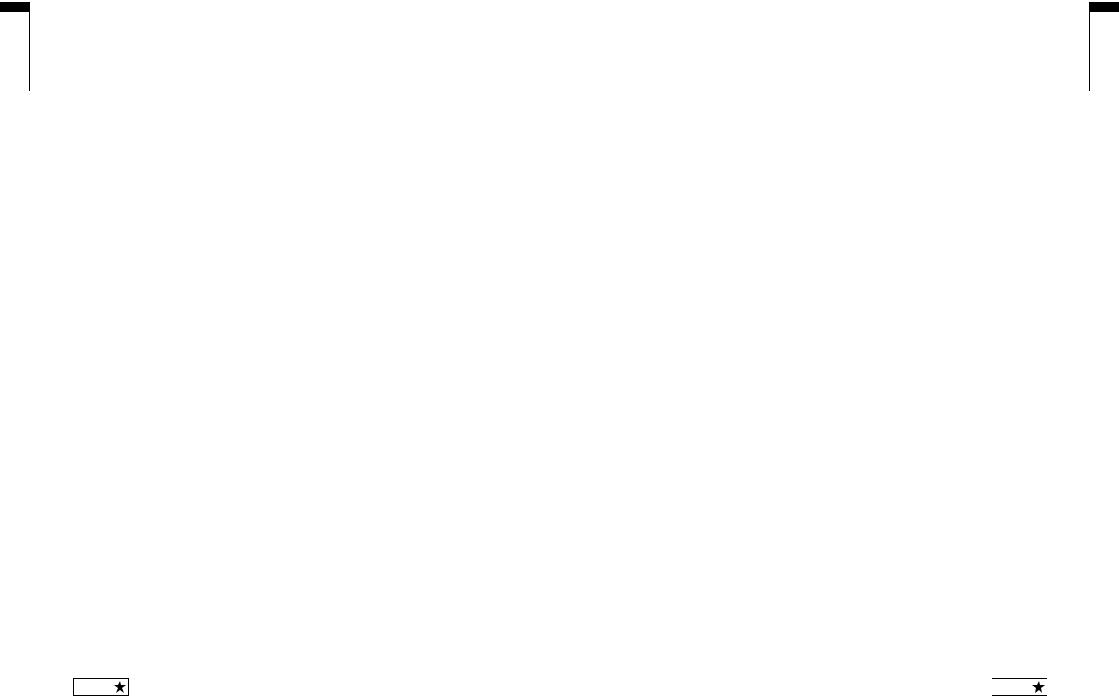
English
USB Audio
Standard audio drivers are used to connect the amplifier to a PC or Mac, no specific drivers are required.
The amplifier will appear as an audio capture device within recording software.
The output of the audio over USB can be changed via the Blackstar Insider software, and can be one of the following:
Speaker emulated stereo effected audio channels
2 x mono audio channels
-Left – effected amplifier signal
-Right – unprocessed guitar signal
Re-amping Mode
Re-amping
The amplifier can be switched into Re-amping Mode via Blackstar Insider software. This is a non-storable setting and will be switched off either when the USB cable is removed, or when the amplifier power is switched off.
When activated, Re-amping Mode allows the amplifier to accept a pre-recorded, dry guitar signal via USB and return a fully processed audio signal. This return signal can then be captured using recording software on the connected PC or Mac.
Firmware Update
Firmware updates are initiated via Blackstar Insider software. A new version of the Blackstar Insider software will be released whenever an update is available. Each update will take approximately 60-120 seconds.
When the amplifier is connected (via USB) to a version of the Blackstar Insider software containing newer firmware, a message will be displayed, prompting you to install the latest files. Whilst updating, the amplifier controls will be unresponsive. The
Tap LED flashes to indicate data activity during the update process.
The amplifier power should not be switched off during a firmware update. If the amplifier is switched off during an update, the controls will be unresponsive after the power is reapplied and the amplifier will produce no sound. The Tap LED will flash to indicate that the amplifier contains no valid firmware.
The amplifier must be connected to the Blackstar Insider software to reinstall valid firmware. The update process will start automatically if the Blackstar Insider software detects that the amplifier is in this state.
Technical Specification
ID:60TVP
Power: 60 Watts
Weight (kg): 18
Dimensions (mm): 584(W) x 485(H) x 250(D)
Footswitch (not supplied): FS-4 latching footswitch, FS-10 footcontroller,
MIDI footcontroller
ID:60TVP-H
Power: 60 Watts
Weight (kg): 10.8
Dimensions (mm): 584(W) x 236(H) x 225(D)
Footswitch (not supplied): FS-4 latching footswitch, FS-10 footcontroller,
MIDI footcontroller
ID:260TVP
Power: 2 x 60 Watts (Stereo)
Weight (kg): 24.2
Dimensions (mm): 686(W) x 510(H) x 250(D)
Footswitch (not supplied): FS-4 latching footswitch, FS-10 footcontroller,
MIDI footcontroller
ID:100TVP
Power: 100 Watts
Weight (kg): 12.8
Dimensions (mm): 686(W) x 246(H) x 225 (D)
Footswitch (not supplied): FS-4 latching footswitch, FS-10 footcontroller,
MIDI footcontroller
English
20 |
|
|
|
|
21 |
|
|
|
|
|
|
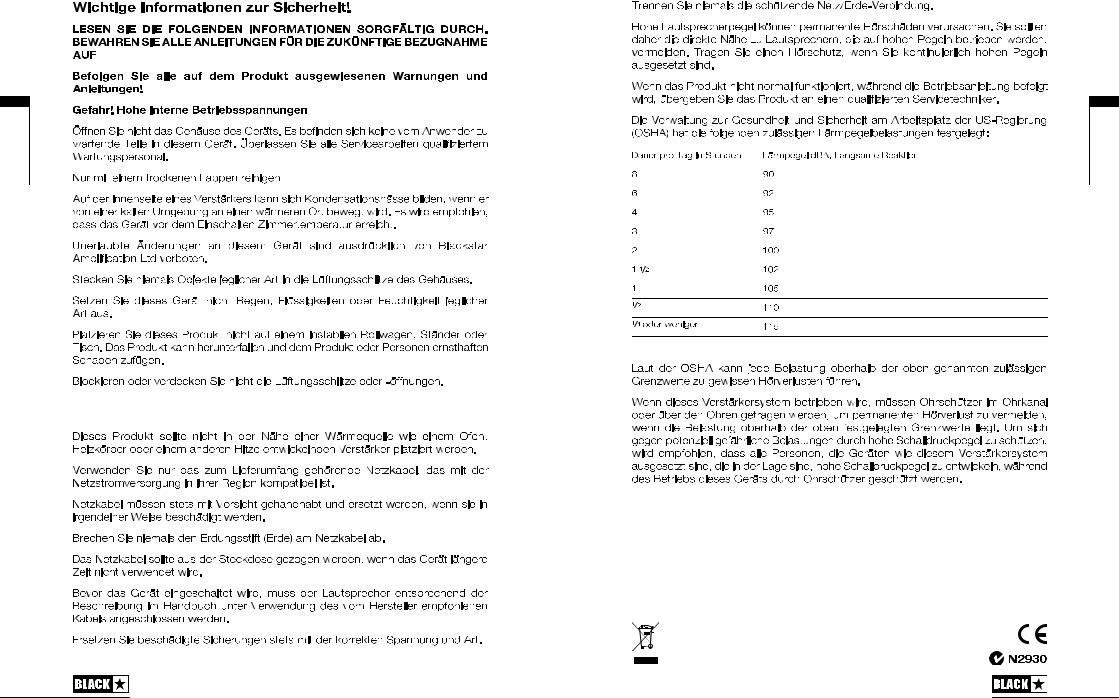
Deutsch
Deutsch
Bitte benutzen Sie das Gerät nur in gut belüfteten Räumen und schalten Sie es nie in schlecht belüfteten Umgebungen, wie z.B. Schränken o.ä. an.
22
All electrical and electronic products should be disposed of separately from the municipal waste stream via designated collection facilities appointed by the government or the local authorities.
23
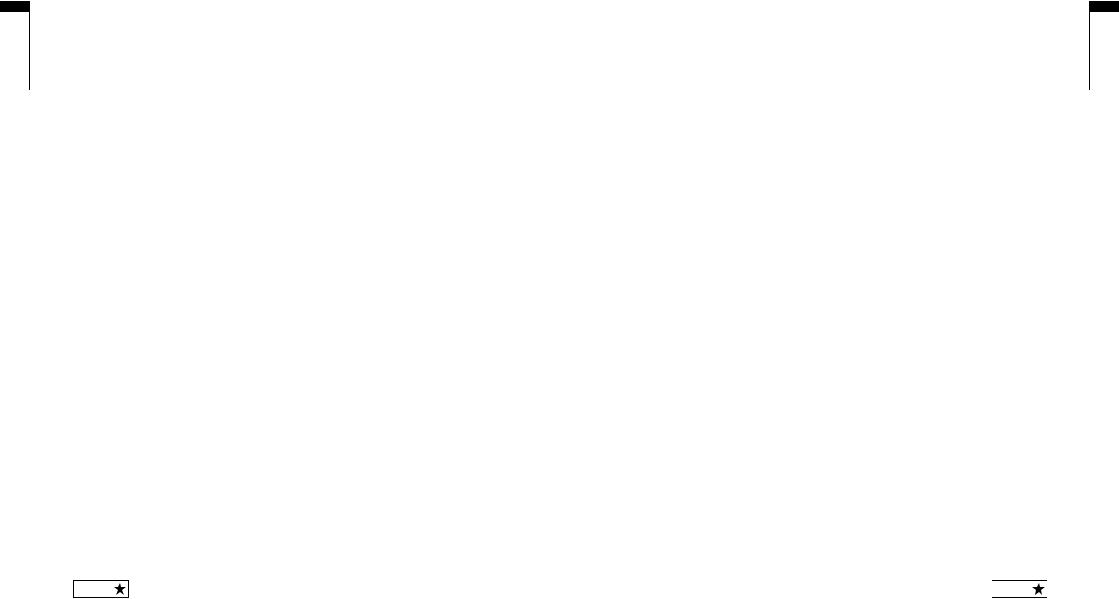
Deutsch
Einleitung
Vielen Dank, dass Sie sich für den Blackstar ID:Series Verstärker entschieden haben. Dieser Amp ist wie alle unsere Verstärker das Ergebnis unzähliger Stunden akribischer Arbeit durch unser erstklassiges Entwickler-Team. Blackstar hat seinen Sitz in Northampton (UK) und setzt sich aus einem Team erfahrener Musiker zusammen, die nur ein Ziel verfolgen: Gitarristen mit den Werkzeugen zu versorgen, die ihnen dabei helfen, sich selbst zu verwirklichen.
Alle Blackstar-Produkte wurden sowohl in unseren Labors als auch im Live-Betrieb auf Herz und Nieren getestet, um sicherzustellen, dass sie in puncto Zuverlässigkeit, Qualität und KLANG absolut kompromisslose Ergebnisse liefern.
Die ID:Series ist eine wirklich bahnbrechende Neuvorstellung, die einzigartige Innovationen mit intuitiv-traditionellen Bedienelemente und einer vielseitigen
Programmierbarkeit kombiniert.
Bitte lesen Sie dieses Handbuch aufmerksam durch, um Ihr neues BlackstarProdukt optimal nutzen zu können.
Wenn Sie mehr über die Blackstar-Produktreihe erfahren möchten, besuchen Sie unsere Webseite unter www.blackstaramps.com.
Vielen Dank!
Das Blackstar-Team
Merkmale
In den 5 Jahren seit Gründung hat Blackstar sehr viel für die Innovation von Gitarrenverstärkern getan. Die ID-Series ist nun das Ergebnis aus sieben Jahren technischer Forschung und Entwicklung. Diese Verstärker bieten die gewohnt intuitiven Bedienelemente eines traditionellen Amps, sind aufgrund ihrer Programmierbarkeit aber deutlich vielseitiger. Die einzigartigen Steuermöglichkeiten erlauben es Ihnen als Gitarrist, Ihren ganz persönlichen Sound zu finden, einzustellen und dann in jeder Live-Situation identisch abzurufen.
Die von Blackstar zum Patent angemeldete True Valve Power bietet sechs unterschiedliche Charakteristika von Endstufenröhren – EL84, 6V6, EL34, KT66, 6L6 und KT88. Diese Funktion sorgt für eine authentische Ansprache, Dynamik sowie das „Sag“- und das Sättigungsverhalten eines Röhren-Amps und liefert definitiv dieselbe akustische Power wie eine vergleichbare Röhren-Endstufe. Diese Amps präsentieren sich live absolut kompromisslos – True Valve Power bedeutet: LOUD as ValveTM.
Der Voice-Regler bietet sechs unterschiedliche Einstellungen – Clean Warm, Clean Bright, Crunch, Super Crunch, OD 1, OD 2. In Verbindung mit dem für Blackstar patentierten ISF-Regler erzielen Sie genau den gewünschten Sound.
Die Effekt-Sektion erzeugt gleichzeitig Modulations-, Delayund Reverb-Effekte in Studio-Qualität, die Sie zusammen mit Ihren Sounds abspeichern können.
Mit Hilfe der mitgelieferten Blackstar Insider Software gestaltet sich die tief greifende Editierung ebenso wie das Speichern von Patches extrem einfach. Patches können über die Online Community hochgeladen, heruntergeladen und ausgetauscht werden. Über den USB-Anschluss können Sie über den Amp direkt auf den
Computer aufnehmen.
Ein emulierter Ausgang, ein MP3/Line-Eingang sowie eine MIDI-Umschaltung per
Fuß komplettieren das Angebot.
Dank des einzigartigen Voice-Reglers, der patentierten ISF-Schaltung sowie der zum Patent angemeldeten True Valve Power bieten ID-Verstärker eine unvergleichliche Flexibilität bei einfacher Bedienung, die es in Ihnen erlaubt, den Sound, den Sie sich vorstellen, live mit der LOUD as ValveTM zu realisieren. Individuality is Power!
Deutsch
24 |
|
|
|
|
25 |
|
|
|
|
|
|

Deutsch
Demo-Modus
Wenn der Verstärker zum ersten Mal in Betrieb genommen oder auf die Werkseinstellungen zurückgesetzt wird, befindet er sich im ‚Demo-Modus’. Der Sound, den Sie hören, entspricht – wie im Manual-Modus – den physikalischen Reglerpositionen. Alle Effekte sowie TVP sind deaktiviert.
Alle Patch-Speicherplätze sind mit Werkseinstellungen von Blackstar belegt. Sie können Patches im Demo-Modus erzeugen und speichern, allerdings werden die ursprünglichen Werks-Patches und -Einstellungen immer wiederhergestellt, wenn der Verstärker ausund wieder eingeschaltet wird.
Um den Demo-Modus zu verlassen, halten Sie den Taster Manual (22) gedrückt, während Sie den Verstärker einschalten. Die Bank-LED (23) wechselt von rot über orange zu grün und erlischt schließlich: Der Demo-Modus ist nun deaktiviert. Wenn Sie den Taster Manual loslassen, bevor die Bank-LED alle Farben durchlaufen hat und erloschen ist, wird der Vorgang abgebrochen und der Verstärker arbeitet weiterhin im Demo-Modus.
Sie können den Demo-Modus auch über die Blackstar Insider Software beenden. Klicken Sie innerhalb des Programms mit der rechten Maustaste auf den Eintrag Demo Mode und wählen Sie ‚Disable’.
Factory Reset
Die Werks-Patches und -Einstellungen können im Verstärker zu jeder Zeit wiederhergestellt werden. Halten Sie die Tasten MOD, DLY und REV gleichzeitig gedrückt, während Sie den Verstärker einschalten. Die Bank-LED leuchtet und wechselt von grün über orange zu rot: Das bedeutet, dass ein Factory Reset durchgeführt wird. Dieser Vorgang dauert etwa zwei Sekunden. Wenn Sie eine der Tasten MOD, DLY und REV loslassen, bevor die Bank-LED alle Farben durchlaufen hat und erloschen ist, wird der Vorgang abgebrochen und der Verstärker wird nicht zurückgesetzt.
Nach diesem Vorgang befindet sich der Verstärker wieder im Demo-Modus.
WICHTIGER HINWEIS: Dieser Vorgang überschreibt alle vom Anwender angelegten Daten.
Deutsch
26 |
|
|
|
|
27 |
|
|
|
|
|
|
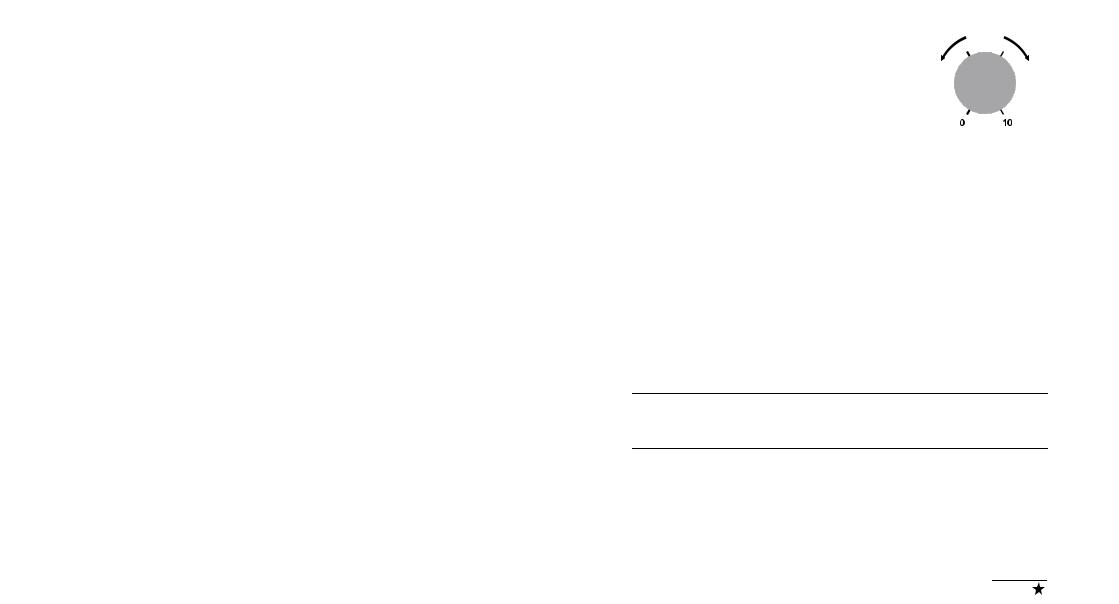
Deutsch
Vorderseite
1. Input
Hier schließen Sie Ihre Gitarre an. Verwenden Sie in jedem Fall hochwertige geschirmte Gitarrenkabel.
2. Voice
Der Voice-Regler verändert das Preamp-Voicing im Bereich von extrem clean bis extrem übersteuert.
Clean Warm – Sehr clean, dynamisch
Clean Bright – ‚Boutique’, übersteuert bei hartem Anschlag
Crunch – Klassischer Overdrive bei mittlerem Gain
Super Crunch – Mehr Gain und Druck als Crunch
OD 1 – „Aufgebohrter“ Overdrive-Sound über das Master Volume mit mittlerer Endstufen-Dämpfung.
OD 2 – Heftiger Overdrive-Sound mit Mitten-Boost
Diese Einstellung wird beim Sichern eines Patches gespeichert.
3. Gain
Mit dem Gain-Regler steuern Sie den Grad der Übersteuerung bzw. Verzerrung. Niedrige Einstellungen (gegen den Uhrzeigersinn) liefern einen cleanen Sound mit viel Druck und Durchsetzungsvermögen. Wenn der Gain-Regler im Uhrzeigersinn aufgedreht wird, nimmt der Verzerrungsgrad mehr und mehr zu und wechselt von crunchigen Sounds bis hin zu stark verzerrten Sounds in der Extremposition. Diese Einstellung wird beim Sichern eines Patches gespeichert.
4. Volume
Dieser Regler steuert die Aussteuerung des Preamps. Im Uhrzeigersinn heben
Sie die Lautstärke an. Abhängig von der Einstellung für TVP (9) tritt bei höherer Lautstärke ein Sättigungsund Kompressionseffekt in der Röhren-Endstufe auf. Diese Einstellung wird beim Sichern eines Patches gespeichert.
5. Bass
Der Bass-Regler steuert den Anteil der Bassfrequenzen im Gesamt-Sound. Dieser Verstärker bietet eine umfangreiche Klangregelung, mit der Sie den Ton zwischen knackig und aggressiv (gegen den Uhrzeigersinn) oder warm und druckvoll (im Uhrzeigersinn) einstellen können. Diese Einstellung wird beim Sichern eines Patches gespeichert.
6. Middle
Der Middle-Regler steuert den Anteil der Mittenfrequenzen im Gesamt-Sound. Die Mitten sind insbesondere für den Grundsound entscheidend. In der Minimalposition (komplett gegen den Uhrzeigersinn) ist der Sound sehr aggressiv und hohl, was sich speziell für knackige Rhythmus-Parts eignet. Wenn der Mitten-Regler angehoben wird (im Uhrzeigersinn), nimmt der Grundton-Anteil zu, was sich für singende LeadSounds empfiehlt. Diese Einstellung wird beim Sichern eines Patches gespeichert.
7. Treble
Mit dem Regler Treble können Sie gezielt den Höhenanteil im Gesamt-Sound einstellen. Bei niedrigen Einstellungen (gegen den Uhrzeigersinn) erhält der Sound einen warmen und dunkleren Charakter. Wenn der Treble-Regler angehoben wird
(im Uhrzeigersinn), wird der Sound immer höhenreicher. In der Maximalposition klingt der Sound schließlich aggressiv und schneidend. Diese Einstellung wird beim Sichern eines Patches gespeichert.
8. ISF |
|
|
|
|
Der patentierte ISF-Regler arbeitet mit den Reglern für |
|
|
|
|
|
|
|
|
|
Bass, Middle und Treble zusammen. Mit seiner Hilfe |
|
|
|
|
finden Sie die genau die Klangfärbung, die Sie suchen. |
|
|
|
|
Bei Einstellungen gegen den Uhrzeigersinn besitzt der |
USA |
|
|
UK |
Amp einen „amerikanischen“ Sound-Charakter mit |
|
|
|
|
|
|
|
|
|
einem knackigen Bassfundament und aggressiveren |
|
|
|
|
Mitten. Bei Einstellungen im Uhrzeigersinn erzeugt der |
|
|
|
|
Amp einen „britischen“ Sound, der deutlich erdiger und |
|
|
|
|
weniger aggressiv klingt. |
|
|
|
|
Im Gegensatz zu herkömmlichen ‚Contour’-Reglern und parametrischen EQSystemen beeinflussen sich die Regler für Bass, Middle und Treble gegenseitig –so wie man das aus klassischen Gitarren-Stacks her kennt. Das führt letztlich zu einem vertrauten, musikalischen Verhalten. Diese Einstellung wird beim Sichern eines
Patches gespeichert.
9. TVP (True Valve Power) Wahlschalter
Die von Blackstar zum Patent angemeldete True Valve Power bietet sechs unterschiedliche Charakteristika von Endstufenröhren – EL84, 6V6, EL34, KT66, 6L6 und KT88. Diese Funktion sorgt für eine authentische Ansprache, Dynamik sowie das „Sag“- und das Sättigungsverhalten eines Röhren-Amps und liefert definitiv dieselbe akustische Power wie eine vergleichbare Röhren-Endstufe. Diese Amps präsentieren sich live absolut kompromisslos – True Valve Power bedeutet: LAUT wie eine RöhreTM.
TVP verändert die Klangcharakteristik – von komprimiert und druckvoll bis dynamisch und knackig.
EL84 |
Glockig-kräftiger Class-A-Sound mit viel Kompression |
6V6 |
Knackiger Class-A-Sound mit starker Kompression und kräftigen Mitten |
EL34 |
Klassischer britischer Class-A/B-Crunch mit ebenso mächtiger wie angenehmer Übersteuerung |
KT66 |
Voller, warmer und typisch britischer Vintage-Class-A/B-Sound mit kräftigem Bias |
6L6 |
Kraftvoller, dynamischer Class-A/B-Sound mit betonten Bässen und Höhen |
KT88 |
Knackig-fetter und dynamischer Class-A/B-Sound mit kräftigem Bass-Fundament |
Wenn Sie von EL84 auf KT88 umschalten, wird der Kompressionsgrad und die Übersteuerungsreserve in der Röhrenansprache reduziert. Bei den beiden CleanVoices hängt die Ausgangskompression und -übersteuerung zudem von der Stellung des Gain-Reglers ab.
Diese Einstellung wird beim Sichern eines Patches gespeichert.
Deutsch
28 |
|
|
|
29 |
|
|
|
|
|
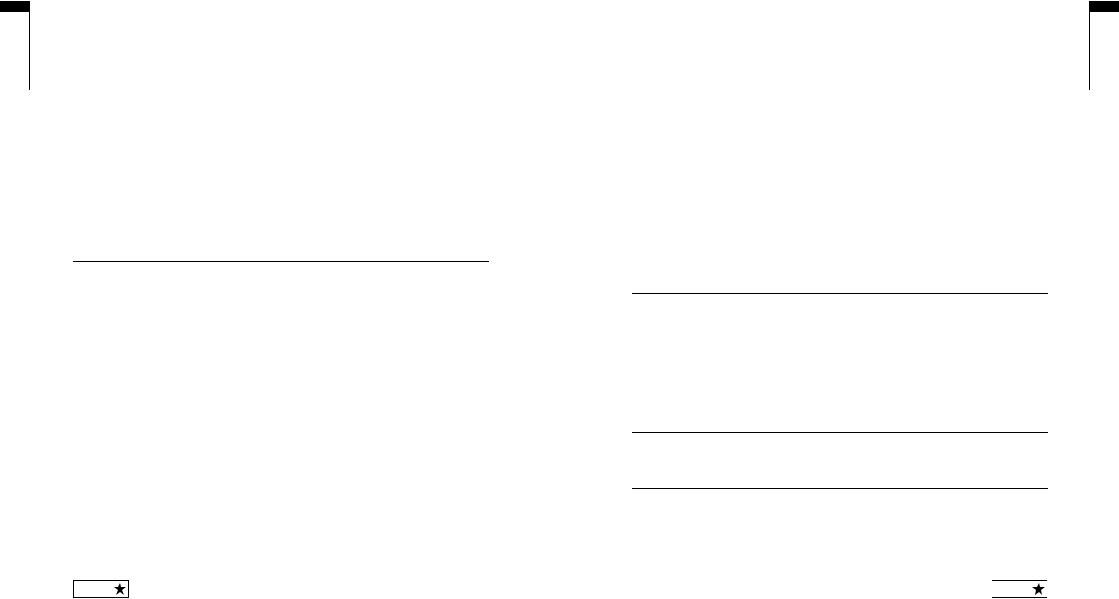
Deutsch
10. TVP (True Valve Power) Taster
Mit diesem Taster (de-)aktivieren Sie TVP. Die in dem Taster integrierte LED leuchtet, wenn TVP aktiv ist. Wenn die LED nicht leuchtet, ist TVP inaktiv und der TVP-
Wahlschalter ist deaktiviert. Diese Einstellung wird mit dem Patch gespeichert.
ANMERKUNG: Wenn TVP inaktiv ist, liefert die Endstufe eine lineare Ansprache: Röhren-typische Effekte wie das „Sag“, die Kompression und Power von TVP stehen entsprechend nicht zur Verfügung.
Effekte
Bis zu drei Effekte in Studio-Qualität können zu jeder Zeit aktiviert werden.
11. MOD (Modulation)
Mit diesem Schalter (de-)aktivieren Sie den Modulationseffekt oder wählen ihn zur Editierung aus. Diese Einstellung wird beim Sichern eines Patches gespeichert.
12. DLY (Delay)
Mit diesem Schalter (de-)aktivieren Sie den Delay-Effekt oder wählen ihn zur Editierung aus. Diese Einstellung wird beim Sichern eines Patches gespeichert.
13. REV (Reverb)
Mit diesem Schalter (de-)aktivieren Sie den Reverb-Effekt oder wählen ihn zur Editierung aus. Diese Einstellung wird beim Sichern eines Patches gespeichert.
Die LEDs von allen drei Effekt-Tastern zeigen den aktuellen Status:
LED |
Effekt-Status |
Beschreibung |
LED inaktiv |
Effekt aus |
Effekt inaktiv |
LED rot |
Effekt aktiv, aber nicht für die Editierung |
Effekt ist aktiv, wird aber nicht über die Effekt- |
|
ausgewählt |
Regler auf der Front gesteuert |
LED grün |
Effekt aktiv und für die Editierung |
Effekt ist aktiv und wird über die Effekt-Regler |
|
ausgewählt |
gesteuert |
Ein wiederholtes Drücken der Effekt-Taster auf der Vorderseite hat den folgenden Effekt:
Effekt aus |
Aktiviert den Effekt und setzt den Effekt in den ‚Fokus’. Der bisherige ‚Fokus’- |
|
Effekt wird in den Status ‚On’ geschaltet |
Effekt aktiv, aber nicht im |
Setzt den Effekt in den Fokus. Der bisherige ‚Fokus’-Effekt wird in den Status |
‚Fokus’ |
‚On’ geschaltet |
Effekt aktiv und im ‚Fokus’ |
Schaltet den Effekt aus. Wenn ein (oder mehrere) andere(r) Effekt aktiv ist, |
|
bleibt der bisherige ‚Fokus’-Effekt weiterhin im ‚Fokus’ |
ANMERKUNG: Es kann immer nur ein Effekt im ‚Fokus’ stehen.
14. Effekt-Type
Hier wählen Sie den Effekt-Typ und editieren einen Parameter des aktuellen ‚Fokus’- Effekts (Modulation, Delay oder Reverb).
Jedes Segment steht für einen anderen Effekt (vier für jeden Effekt-Typ). Eine LED zeigt, welcher Effekt-Typ momentan aktiv ist. Der Regelweg innerhalb des ‚Segments’ verändert den jeweiligen Effekt-Parameter. Die Effekt Tabelle unten listet alle einstellbaren Parameter auf:
Diese Einstellung wird beim Sichern eines Patches gespeichert.
15. Effekt-Level
Dieser Regler verändert einen Effekt-Parameter. Bei Modulationsund Delay-Effekten können Sie mit dem Level-Regler bei gehaltenem Tap-Taster (16) die Rate/Time des Effekts verändern.
Die Effekt Tabelle unten listet alle einstellbaren Parameter auf:
Diese Einstellung wird beim Sichern eines Patches gespeichert.
16. Tap
Der Tap-Taster dient zur Eingabe der Rate/Time des Effekts im aktuellen ‚Fokus’. Die Dauer zwischen jedem Drücken des Tap-Tasters bestimmt die Rate-Einstellung.
Nach der Einstellung blinkt die Tap-LED in der Geschwindigkeit, die für den Effekt im ‚Fokus’ eingegeben wurde.
Die Effekt Tabelle unten listet alle einstellbaren Parameter auf:
Effekt Tabelle
Effekt |
Segment-Parameter |
Level-Parameter |
Tap-Parameter |
MODULATION |
|
|
|
Phaser |
Mix |
Depth |
Speed |
Flanger |
Feedback |
Depth |
Speed |
Chorus |
Mix |
Depth |
Speed |
Tremolo |
Depth der Frequenz- |
Depth der Amplituden- |
Speed |
|
Modulation |
Modulation |
|
DELAY |
|
|
|
Linear |
Feedback |
Delay level |
Time |
Analogue |
Feedback |
Delay level |
Time |
Tape |
Feedback |
Delay level |
Time |
Multi |
Feedback |
Delay level |
Time |
REVERB |
|
|
|
Room |
Size |
Reverb level |
- |
Hall |
Size |
Reverb level |
- |
Spring |
Size |
Reverb level |
- |
Plate |
Size |
Reverb level |
- |
Diese Einstellung wird beim Sichern eines Patches gespeichert.
Deutsch
30 |
|
|
|
|
31 |
|
|
|
|
|
|
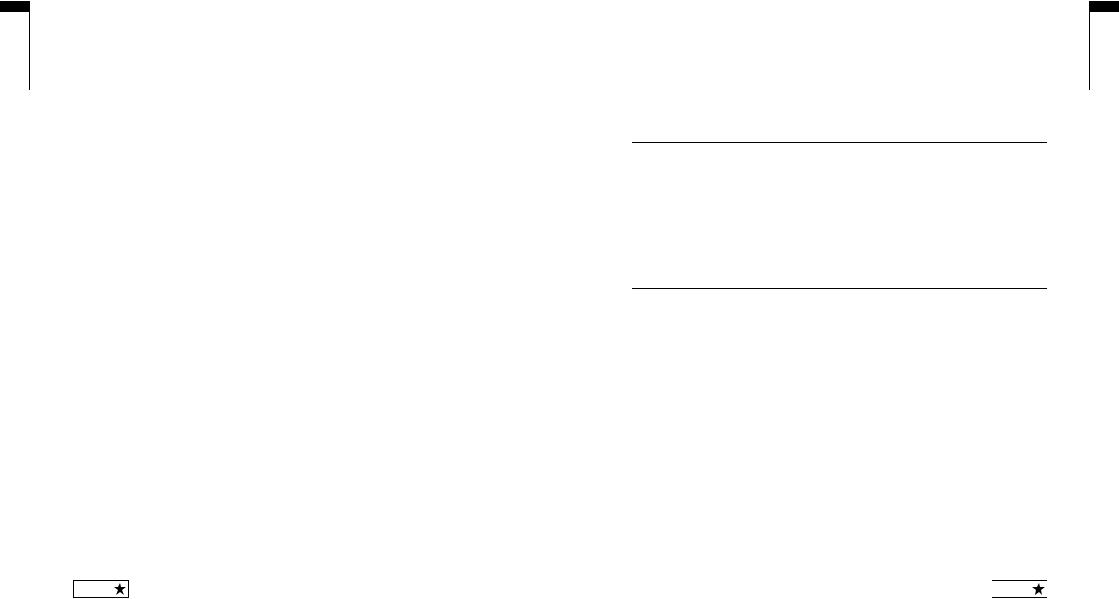
Deutsch
Master
17. Resonance
Der Resonance-Regler steuert global die Ansprache im Bassbereich. Bei niedrigen Einstellungen klingen cleane Sounds knackig und funky, während bei angezerrten Sounds die Basswiedergabe angehoben wird. Bei höheren Einstellungen klingen Clean-Sounds voll und warm, während sich Crunchund Overdrive-Sounds durch wuchtige Bässe und Druck auszeichnen.
Hierbei handelt es sich um eine globale Einstellung, die nicht in den Patches gespeichert wird.
18. Presence
Der Presence-Regler steuert global die Ansprache im Höhenbereich. Perkussive Höhen werden bei cleanen Sounds betont, aggressive Höhen lassen sich bei Crunchund Overdrive-Sounds gezielt steuern.
Hierbei handelt es sich um eine globale Einstellung, die nicht in den Patches gespeichert wird.
19. Master Volume
Dieser Regler steuert die Gesamtlautstärke Ihres Verstärkers. Im Uhrzeigersinn heben Sie die Lautstärke an. Hierbei handelt es sich um eine globale Einstellung, die nicht in den Patches gespeichert wird.
Wenn das Master Volume auf 0 heruntergezogen ist, können Sie ohne den Lautsprecher über den emulierten Ausgang oder über USB Aufnahmen machen. Der Pegel der Emulation wird über das Preamp-Volume ausgesteuert.
20. Power Schalter
Mit diesem Schalter schalten Sie den Verstärker ein bzw. aus.
ANMERKUNG: Wenn Sie den Verstärker aus dem Demo-Modus heraus ausund wieder einschalten, werden die Werkseinstellungen wiederhergestellt. Wenn der
Demo-Modus nicht aktiv ist, befindet sich der Verstärker nach dem Einschalten wieder im vorher aktiven Modus.
21. USB
Hier schließen Sie ein USB-Kabel an, um den Verstärker mit einem Windows PC oder einem Mac zu verbinden. Die Blackstar Insider-Software kann von unserer
Webseite heruntergeladen werden und bietet zahlreiche Funktionen.
Lesen Sie dazu den Abschnitt USB Audio auf Seite 39.
ANMERKUNG: Der Verstärker erscheint innerhalb der Aufnahme-Software auf einem Computer als Audio-Interface.
22. Manual
Mit diesem Taster schalten Sie zwischen dem Manual-Modus und dem aktuellen Patch um. Im Manual-Modus entspricht der Sound den aktuellen physikalischen Positionen der Regler. Das gilt für die Regler Voice, Gain, Volume, Bass, Middle,
Treble, ISF und TVP. Der On/Off-Status für TVP wird vom vorher aktiven Patch übernommen. Alle Effekte, die beim Umschalten in den Manual-Modus aktiv sind, werden abgeschaltet.
Im Manual-Modus können alle Regler weiterhin über externe Quellen (Blackstar Insider Software, Fußschalter, MIDI-Controller) gesteuert werden. Das bedeutet aber, dass der Sound nicht den physikalischen Positionen der Regler auf der Front entspricht.
Tuner-Modus
Halten Sie den Manual-Taster (22) drei Sekunden gedrückt, um den Tuner zu aktivieren. Die LED der Recall-Anzeige (28) blinkt dauerhaft und zeigt so, dass der Tuner-Modus aktiv ist. In der Voreinstellung wird der Verstärkerausgang stumm geschaltet, wenn der Tuner-Modus aktiv ist. Über die LEDs Manual, Bank und Channel wird die Note angezeigt, die der gespielten Note am nächsten kommt.
Bank LED |
Saite 1 und 6 (Vorgabe E, tief/hoch) |
CH1 LED |
Saite 2 |
CH2 LED |
Saite 3 |
CH3 LED |
Saite 4 |
CH4 LED |
Saite 5 |
Über die LEDs MOD, DLY und REV wird dargestellt, wie nah die gespielte Note der
Referenzstimmung kommt.
MOD LED rot |
Note (Stimmung) ist zu hoch |
DLY LED grün |
Note ist korrekt gestimmt |
REV LED rot |
Note (Stimmung) ist zu tief |
Alle anderen LEDs auf der Vorderseite sind im Tuner-Modus inaktiv.
Durch Drücken eines Tasters auf der Front oder eines angeschlossenen Fußschalters beenden Sie den Tuner-Modus.
23. Bank
Drücken Sie diesen Taster, um durch die ersten drei Patch-Bänke zu blättern.
Bank 1 2
Bank 2 3
Bank 3 1
Die grüne LED zeigt, dass Sie sich in Bank 1 befinden, die orange LED steht für Bank 2 und die rote schließlich für Bank 3.
ANMERKUNG: Über die Frontseite können Sie nur auf die ersten drei Bänke zugreifen. Wenn Sie Bank 4 oder höher über einen externen Controller (z.B. Software oder Fuß-Controller) aktivieren, leuchten anstelle der Bank-LEDs nun die ChannelLEDs und zeigen den Patch-Speicherplatz an.
Deutsch
32 |
|
|
|
|
33 |
|
|
|
|
|
|
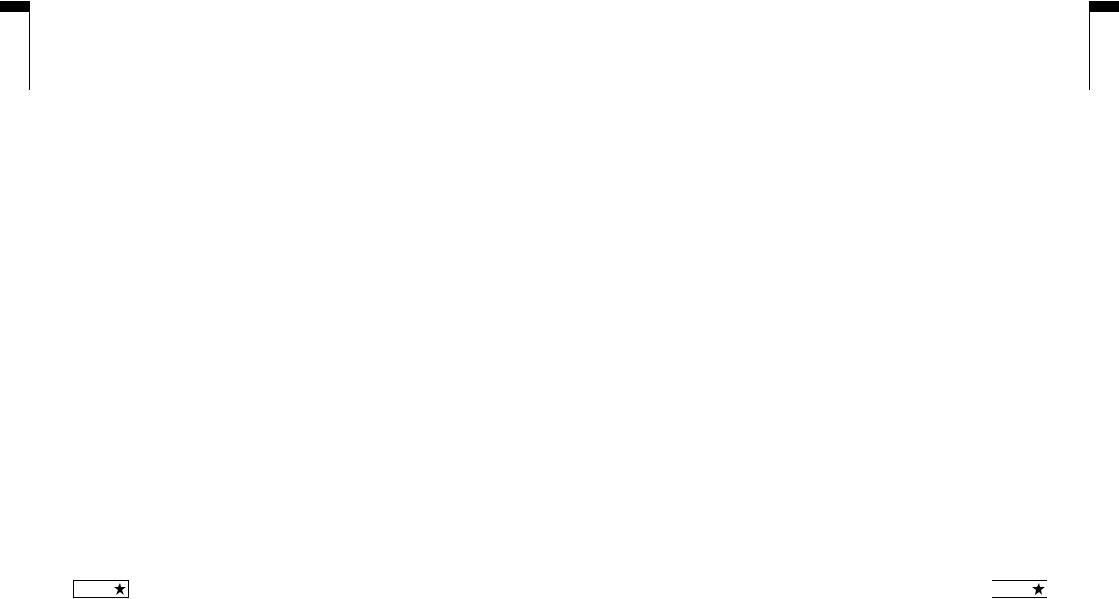
Deutsch
Ein Beispiel:
Patch 11 – Bank-LED rot, LED in Channel 3 leuchtet.
Wenn Sie Bank Up mit einem externen Schalter auswählen, wird Patch 15 aktiviert - Bank LED aus, Channel 3 an.
Wenn der Verstärker im Manual-Modus arbeitet, leuchtet die Bank-LED nicht.
Der Channel wird zwischengespeichert, während das entsprechende Patch innerhalb der aktuellen Bank geladen wird, während Sie durch die Bänke blättern.
24 – 27. Channel 1-4
Channel 1 aktiviert das erste Patch in der aktuellen Bank. Channel 2 aktiviert das zweite Patch in der aktuellen Bank. Channel 3 aktiviert das dritte Patch in der aktuellen Bank. Channel 4 aktiviert das vierte Patch in der aktuellen Bank.
28. Recall-Anzeige
Die Recall-Anzeige zeigt, ob der aktuelle Parameterwert im Verstärker mit der physikalischen Position des zugehörigen Reglers auf der Vorderseite übereinstimmt oder nicht. Wenn Sie z. B. zu einem anderen Patch wechseln, entsprechen die Regler-Einstellungen auf der Frontseite mit Sicherheit nicht den Einstellungen, die Sie hören.
Um unerwünschte Pegelsprünge beim Einstellen der Parameter zu verhindern, haben die Regler auf der Front keine Funktion, bis die physikalische Position den aktuellen Parameterwert erreicht hat. In diesem Moment blinkt die Recall-Anzeige zweimal und der Regler ‚übernimmt’ die Parametersteuerung, so dass Sie den Wert anheben oder absenken können.
Die Recall-Anzeige blinkt jeweils zweimal, wenn der physikalische Regler den im Patch gespeicherten Wert erreicht bzw. überstreicht: So können Sie den programmierten Wert zu jeder Zeit direkt ablesen.
Recall erfasst nur die Parameter Gain, Volume, Bass, Middle, Treble und ISF.
Wenn der Tuner aktiv ist, blinkt die Recall-Anzeige dauerhaft.
Programmierung
Speichern von Patches
So speichern Sie den aktuellen Sound als Patch
1.Drücken und halten Sie einen der vier Channel-Taster für eine Sekunde. Alle vier Channel-LEDs blinken daraufhin.
2.Drücken Sie den Bank-Taster, um zwischen den drei Bänken (grün, orange, rot) umzuschalten und den Speicherplatz auszuwählen.
3.Drücken Sie einen der vier Channel-Taster einmal, um das Patch auf dem gewählten Speicherplatz abzuspeichern.
Die LED für den gewählten Speicherplatz leuchtet und das neue Patch ist aktiv. Grüne Bank = Patches 1-4
Orange Bank = Patches 5-8
Rote Bank = Patches 9-12
Mit Hilfe der Regler am Verstärker können Sie das Patch nun zu jedem Zeitpunkt während dem Speichervorgang editieren.
Drücken Sie den Manual-Taster bei Bedarf, um den Speichervorgang abzubrechen: Der Verstärker wird in den vorherigen Zustand zurückversetzt.
Das Speichern eines Patches überschreibt ein auf dem Speicherplatz eventuell vorhandenes Patch.
Patches können auch über die Blackstar Insider Software oder mit Hilfe eines angeschlossenen Blackstar FS-10 Fuß-Controllers gespeichert werden.
Laden von Patches
Drücken Sie einen Channel-Taster, um das zugehörige Patch zu laden.
Durch Drücken des Bank-Tasters blättern Sie durch die drei Bänke – grüne-orange- rot. Der Channel bleibt erhalten, während das entsprechende Patch innerhalb der aktuellen Bank geladen wird, während Sie durch die Bänke blättern.
Alternativ können Sie Patches über die Blackstar Insider Software oder einen angeschlossenen Fußschalter laden.
Deutsch
34 |
|
|
|
|
35 |
|
|
|
|
|
|
